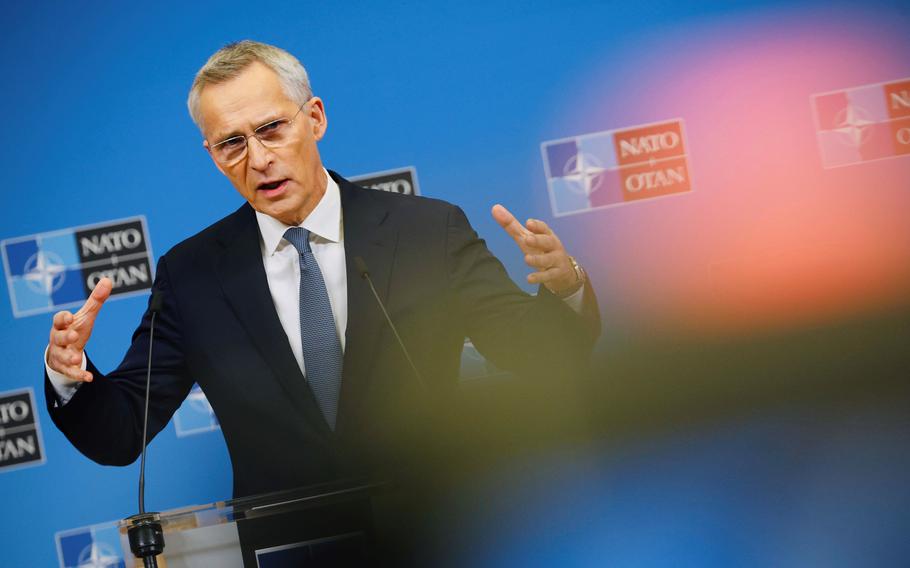
NATO Secretary-General Jens Stoltenberg answers a question Nov. 27, 2023, at a news conference in Brussels on the eve of a meeting at alliance headquarters featuring U.S. Secretary of State Antony Blinken and NATO country foreign ministers. (NATO)
Sacrificing territory to Russia to end the fighting in Ukraine is a decision only Kyiv can make, NATO’s top official said Monday ahead of high-level security talks this week at the alliance’s Brussels headquarters.
“It is for Ukraine to decide what are acceptable ways to end this war,” NATO Secretary-General Jens Stoltenberg said in response to a question about proposals for Ukraine to relinquish territory in exchange for NATO membership — and the security guarantees that come with it.
But Stoltenberg only reaffirmed NATO’s position that it will support Ukraine for the long haul and thereby place it in “a stronger position at the potential negotiating table.”
On Tuesday, U.S. Secretary of State Antony Blinken will join his NATO counterparts in Brussels, where the wars in Ukraine and Gaza are expected to dominate the agenda.
Stoltenberg called for an extension of the pause in the fighting between Israel and Hamas while speaking to reporters on the eve of the talks.
“This would allow for much-needed relief to the people of Gaza and the release of more hostages,” he said.
Stoltenberg also talked up the performance of Ukraine’s military, which he said has exceeded all expectations. When the war started in February 2022, it was assumed that Ukraine would fall to Russia in a matter of weeks, Stoltenberg said.
“Last year, Ukraine won the battles for Kyiv, Kharkiv and Kherson. This year, they continue to inflict heavy losses on Russia,” Stoltenberg said. “Ukraine has recaptured 50% of the territory that Russia seized.”
But most of Ukraine’s territorial gains were made during the first nine months of the war. Since then, its much-anticipated counteroffensive has failed to substantially dislodge Russian forces.
The top Ukrainian military commander told The Economist magazine earlier this month that the fight is now essentially a stalemate.
“There will most likely be no deep and beautiful breakthrough,” Gen. Valery Zaluzhny said, adding that Ukraine needs a technological breakthrough to avoid a war of attrition favoring Russia.
Zaluzhny’s sobering assessment also comes amid wavering in Western political support. In the U.S., future funding for Ukraine is now in limbo, with lawmakers at odds over how to proceed.
Meanwhile, recent elections in Slovakia and the Netherlands have seen wins by political leaders opposed to continued support for Ukraine. Such circumstances could intensify pressure on President Volodymyr Zelenskyy and his government to find a way out of the war.
On Friday, Germany’s Bild tabloid newspaper, citing unidentified German government sources, reported that Berlin and Washington intended to pressure Ukraine to negotiate with Russia.
Still, allies are likely to stick to the script this week in Brussels. Stoltenberg said that there is no sign that Russia is ready for peace and that its leader, President Vladimir Putin, is “planning for more war.”
“Ukraine continues to fight bravely. We continue to support them,” Stoltenberg said.